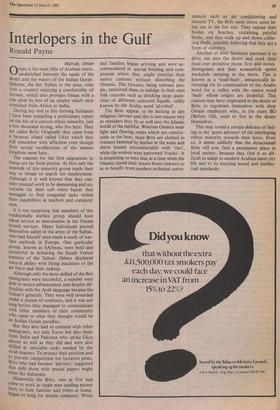Interlopers in the Gulf
Ronald Payne
Matrah, Oman Oman is the most felix of Arabian states, sandwiched between the sands of the desert and the waters of the Indian Ocean. Qabous, the last Sultan in the area, rules over a country enjoying a comfortable oil income, which also provides Oman with a role after its loss of an empire which once stretched from Africa to India.
During my visit to this thriving Sultanate I have been compiling a preliminary report on the life of a curious ethnic minority, just a few thousand strong, who live here. They are called Brits. Originally they came from a faraway island called Ukay which they still remember with affection even though their actual recollections of the remote kingdom seem hazy.
The reasons for the first migrations to Oman are far from precise. At first only the menfolk of this minority group made their way to Oman to search for employment. Although it is well known that they con- sider manual work to be demeaning and un- suitable for their soft white hands they managed to find congenial tasks within their capabilities as teachers and computer men.
It is not surprising that members of this traditionally warlike group should have taken service as mercenaries in the Omani armed services. Many individuals proved themselves adept in the army of the Sultan, who had himself once made a study of war- fare methods in Europe. One particular group, known as SASmen, were bold and successful in defeating the South Yemen enemies of the Sultan. Others displayed natural ability with flying machines of the air force and their upkeep.
Although only the most skilled of the Brit immigrants were successful, a number were able to secure advancement and despite dif- ficulties with the Arab language became the Sultan's generals. They were well rewarded under a system of contracts, and it was not long before they managed to communicate with other members of their community who came to what they thought would be an Indian Ocean paradise.
But they also had to contend with other immigrants, not only Euros but also those from India and Pakistan who spoke Ukay almost as well as they did and were also skilled at specialist tasks needed by the Arab masters. To protect their position and to prevent competition for lucrative posts, Brits who had become 'advisers' suggested that only those with special papers might enter the Sultanate.
Meanwhile the Brits, who at first had come to work as single men sending money back to their families and tribes at home, began to long for female company. Wives and families began arriving and were ac- commodated in special housing and com- pounds where they might practise their native customs without disturbing the Omanis. The Omanis, being tolerant peo- ple, permitted them to indulge in their own folk customs such as drinking large quan- tities of different coloured liquids, oddly known by the Arabic word 'al-cohol'.
The Brits appear to be lacking in any religious fervour and this is one reason why as outsiders they fit so well into the Islamic world of the faithful. Whereas Omanis wear light and flowing robes which are comfor- table in the heat, male Brits are clothed in trousers fastened by leather at the waist and shirts bound uncomfortably with 'ties', while the women wear patterned 'frocks'. It is interesting to note that at a time when the Omanis spend their leisure hours indoors so as to benefit from modern technical conve-
niences such as air conditioning and cassette TV, the Brits seem intent upon be- ing out in the hot sun. They expose their bodies on beaches, sustaining painful burns, and they walk up and down collec- ting shells, possibly believing that they are a form of currency.
Another of their favourite pastimes is to drive out into the desert and cook their food over primitive picnic fires and stoves. Immigrants and their womenfolk spend weekends camping in the waste. This is known as a 'wadi-bash', semantically in- teresting for its combination of the Arabic word for a valley with the native word 'bash' whose origins are doubtful. This custom may have originated in the desire of Brits to ingratiate themselves with their Omani employers who, in the years BO (Before Oil), used to live in the desert themselves.
This may reveal a certain delicacy of feel- ing in the 'guest advisers' of the interloping ethnic minority towards their hosts. Even so, it seems unlikely that the deracinated Brits will ever find a permanent place in local society, because they find it so dif- ficult to adapt to modern Arabian inner city life and to its exacting moral and intellec- tual standards.










































 Previous page
Previous page